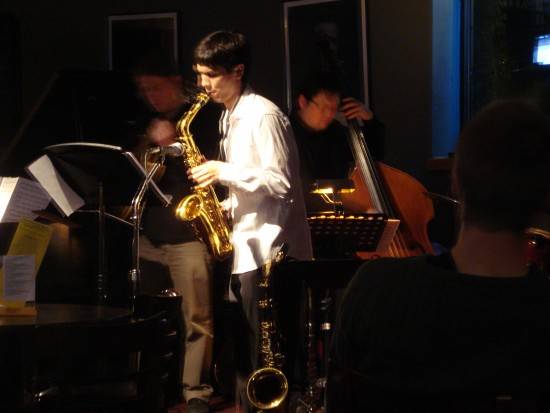
If you’re looking for something a little different this Friday evening, the U-C Independent Media Center (202 S. Broadway, Urbana) has you covered: local sextet Bossa Nuevo will be playing a variety of music from South American composers from 7 to 10 p.m. Cover is $5, and the event is BYOB for those 21 and over with an ID.
I exchanged emails with Bossa Nuevo’s Karim Yengsep, and he gave me a crash course in their style of music. If you’re a fellow novice, or even if you’re a “world” music snob, you might get a kick out of what he had to say.
Smile Politely: How did the group form? Is there a particular logic to this grouping of instruments?
Karim Yengsep: The group formed out of a desire to hear this type of music live. The instrumentation of vocals, woodwinds, guitar, piano, bass, and drums helps us find different colors for various types of arrangements.
Smile Politely: Are you all undergraduate students? If not, what’s everyone up to?
Karim Yengsep: The group’s vocalist, Holly Holmes — a Ph.D. student in Musicology — adds a unique flavor to the pieces by singing the original lyrics in Portuguese. The compositions are introduced by flutist and saxophonist Mikael Templeton — an undergraduate jazz studies major — who further enriches the texture by harmonizing the melody line.
The rhythm section underlines this counterpoint providing a solid background and consists of guitarist and a DMA in Jazz Studies candidate George Turner, pianist and undergraduate jazz studies major Lara Driscoll, bassist and DMA candidate Karim Yengsep, and last, but not the least, a drummer and percussionist, Matt Plaskota.
Smile Politely: By googling “Bossa Nuevo,” I came across an album by JoJo Styles of that name. Is that where the band’s name comes from? If not, what’s the origin of the name?
Karim Yengsep: The band name comes from juxtaposing Bossa Nova and Tango Nuevo – Bossa Nuevo. Tango Nuevo was a movement in Argentine tango inspired by compositions of Astor Piazzolla. We also explore that music as part of our repertoire.
Smile Politely: How much have you performed publicly before? What are you looking forward to about playing at the IMC?
Karim Yengsep: This will be our second performance this fall. We are looking forward to presenting new material and continuing introducing the audience to this beautiful music!
Smile Politely: Do you perform with the intention that people would dance to your music, or is this more of a sit-down affair?
Karim Yengsep: Ideally — yes. If music moves you deep inside and you feel like bursting into dancing, or simply tapping your foot — it means we were able to connect with you through our performance. Simply relaxing and soaking the music works just as well!
Smile Politely: For someone who isn’t familiar with your music, what would you say is a common misconception about South American music?
Karim Yengsep: There’s so much interesting music that you rarely hear performed live. Often times recordings are not available, or are imported (and expensive). We are barely scratching the surface of what’s available with our program, but it certainly helps initiate a public interest in this music!








